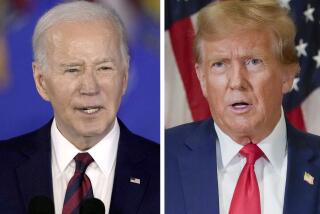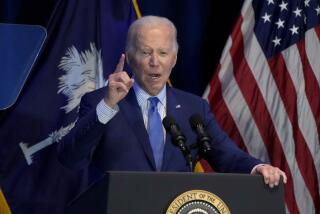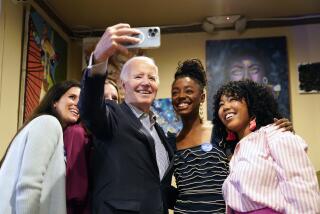Domestic Troubles Challenge Bush Campaign
- Share via
WASHINGTON — When President Bush’s political strategists planned his reelection campaign, they hoped to woo voters with an impressive list of achievements in domestic policy: a resurgent economy, tax cuts, an education plan and a prescription drug benefit for senior citizens. It hasn’t worked out that way.
To Republicans’ distress, Bush has run into trouble on all those fronts. The economy’s recovery has been stubbornly slow. The president’s tax cuts are not universally popular. His education changes have drawn criticism from educators and state officials in both parties. And the Medicare bill has failed to impress elderly voters.
“When President Bush goes to make his case for a second term, his domestic performance will not be his strong suit,” said pollster Andrew Kohut of the nonpartisan Pew Research Center for People and the Press. “It’s not a hopeless thing, but boy -- he has some work to do to get people to feel better about what he has accomplished.”
Republican strategists acknowledge that the president has not yet succeeded in making his domestic agenda an effective selling point.
“When you look at the specific concerns about the Medicare law and No Child Left Behind, they start a little bit rocky,” said Republican pollster Bill McInturff, referring in part to Bush’s education program. “But that’s why God made campaigns.”
One problem, Republicans said, is that the Bush campaign has been slow in starting in a political season that has seen the president’s Democratic rivals focus their criticism on the incumbent (instead of on one another, as the GOP had hoped).
“His Democratic opponents have run more than 36,000 television ads attacking President Bush or his policies,” said Scott Stanzel, a spokesman for the Bush-Cheney campaign. “It’s time to reframe the debate.”
Minnesota’s Republican Gov. Tim Pawlenty noted a second, more troubling problem: So far, Bush’s domestic accomplishments are mostly on paper.
“People have not felt the benefit yet,” Pawlenty said. “Every economic indicator is headed in the right direction. But it’s a question of will the economy recover quickly enough for people to feel not only the statistical benefit, but the emotional benefit as well.”
Pawlenty said he was confident Bush could win Minnesota and other swing states this fall, but only if he could reassure voters on pocketbook issues.
“People are beginning to experience some optimism about the recovering economy, but there’s an underlying anxiety about wage stagnation, and healthcare costs are going up fast,” the governor said.
Other Bush supporters noted that the president had only just begun to campaign. “His speech to the governors shows he’s willing to engage,” said Rep. Fred Upton (R-Mich.), referring to a fiery, partisan speech Bush made last week that included a direct attack on Sen. John F. Kerry (D-Mass.), the likely Democratic nominee. “I wish he had started a little sooner.”
So far, though, the campaign hasn’t given Bush many chances to highlight his “compassionate conservative” agenda of domestic programs such as education and Medicare changes that might appeal to swing voters. Instead, news coverage has focused on more-polarizing issues, notably the president’s endorsement of a constitutional amendment to ban gay marriage.
“Guess what? In a campaign you don’t get to pick the issues you run on,” said McInturff. “Like it or not, this issue [gay marriage] is in the middle of the campaign.”
Bush strategists have long predicted the president would fall behind his Democratic opponent at some point, but they did not expect it to happen so early. Now the campaign is scrambling to launch its first television advertising blitz Thursday, a salvo timed to hit voters just after the Super Tuesday Democratic nominating votes.
A campaign official said the commercials would be positive in tone and would extol Bush’s leadership in two areas: the war on terrorism and the economy. The message of one commercial: “President Bush will not be satisfied until every American who wants to work finds a job.”
“We are rapidly approaching the time when we will begin making the case for the president’s steady leadership,” campaign spokesman Stanzel said. “After months of negative attacks, it’s time to reframe the debate.”
Not a moment too soon, other Republicans said.
“People were definitely itching for the campaign to kick off, to see Bush in campaign mode and being more aggressive,” said Stuart Roy, spokesman for House Majority Leader Tom DeLay (R-Texas). “People were saying, ‘Finally!’ ”
“I think he’s got a great story to tell, and he no doubt will tell it after the horse race coverage [of the Democratic nomination contest] dies down,” said Pawlenty, who is chairman of the Bush campaign in Minnesota.
Public opinion surveys suggest that the president faces an uphill fight on domestic issues, at least initially.
Polls show that voters are slowly becoming more confident that the economy is recovering, but most say they are dissatisfied with Bush’s leadership on the economy, and most do not agree with Bush that his tax cuts deserve credit for the upturn. In a poll by the University of Pennsylvania’s Annenberg Public Policy Center released Feb. 9, 63% of respondents said they got little or no benefit from the tax cuts; only 33% said they derived “some” or “a great deal.”
Instead, many voters, including conservative Republicans, are increasingly concerned about the growing federal budget deficit, pollster Kohut said. Those concerns were fueled by Federal Reserve Chairman Alan Greenspan, who told Congress last week that the deficit imperiled economic growth, and called for curbs on the growth of Social Security benefits.
As for Bush’s Medicare law, a poll released last week by the Kaiser Family Foundation found that almost 70% of senior citizens did not know that it had been enacted. And of those who did know, most said they opposed it.
The Bush administration has launched a TV advertising campaign to publicize the new benefit, and Republicans in Congress are trying to help sell the law to constituents. House GOP leaders have even started an awards program to encourage lawmakers to give more speeches and hold more town meetings to promote the changes.
“We are very keenly aware that we have to get out there and still sell the Medicare bill to seniors,” said a GOP aide. “If we don’t improve our communications -- if we’re having this conversation in August -- then we have problems.”
Said Pawlenty: “The president needs to get full credit for the Medicare bill and at least explain to people that relief is coming, even though they don’t feel it yet.”
Bush’s signature education initiative, No Child Left Behind, has run into trouble with state and school officials, including many Republicans, who say that the law is inadequately funded and that its requirements on schools are too rigid.
Speaking to the National Governors Assn. last week, Bush made it clear that those complaints would not sway him. “I’m going to vigorously defend No Child Left Behind,” he said.
“What you are seeing right now is some very important debate, framing how people look at these issues,” said David Winston, a Republican pollster. “That is why he is shifting into campaign mode. It is critical to define them now in a positive light before you let the other side define them for you. There is a positive story to be told on healthcare and education.”
More to Read
Get the L.A. Times Politics newsletter
Deeply reported insights into legislation, politics and policy from Sacramento, Washington and beyond. In your inbox three times per week.
You may occasionally receive promotional content from the Los Angeles Times.












